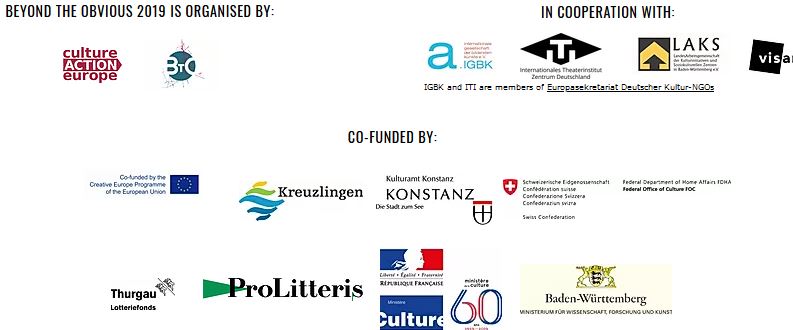23.-26. October 2019 in Konstanz and Kreuzlingen

End of October 2019 the Culture Action Europe Conference „Culture Crops – Cultural Practices in Non-Urban Territories“ took place in Konstanz/Kreuzlingen in the German/ Swiss border region. 170 participants from all over Europe debated on cultural practices in non-urban territories: Where does the rural begin and where does it end? What is the difference between urban visions of the rural and what the rural really is today? How does cultural work in peripheral territories take place and how is it organised?
View the detailed report on the conference here.
Find the detailed program of the conference here.
Hikes and trips to cultural sites in the cities and in the rural surroundings
The unusual format, with hikes and visits to cultural sites in Konstanz and Kreuzlingen and the surrounding area – such as Kunstraum Kreuzlingen, the public library and Theater Konstanz, Kartause Ittingen, Transitory Museum of Pfyn, Haus zur Glocke and many more – specifically helped to foster the exchange amongst the cultural actors from all over Europe. Right after the visits, the local hosts discussed challenges in their day-to-day work, as well as their questions and wishes to political actors in the European Union, with similar projects from other regions of Europe. Furthermore, an open Project Agora gave space to 26 cultural projects and artists from rural areas in Europe.
Policy recommendations discussed on the finishing panel
The conference participants quickly assembled several policy recommendations that were then discussed by the closing panel:
- Policies should focus on supporting the creation of sustainability of communities in non-urban territories, and supporting cultural practices which follow a holistic approach (territorial, cultural, human and economic), respecting the autonomy of the community, fostering motivation and self-empowerment through awareness of existing local values.
- Adopting and diversifying the EU cultural policy in terms of issues of scaling of programmes, evaluation criteria, capacity building, facilitating application processes to reach the goal of true territorial equity.
- Rural communities should have a stronger voice at EU level, best practices in local-policymaking should be visible at EU level and EU institutions should gather more data to support preservation and transmission of knowhow, trans-sectorial practices, long term actions and training programmes to act locally and globally.
- Generate links between cultural policy and the cohesion policy strands and develop transversal action.
- Policies should enable and facilitate exchanges, connectivity, knowledge sharing, information access, cultural and creative practices between rural areas across the EU. Occupational literacy for non-urban and rural areas in the EU helps people to understand and have control over how they spend their leisure time, as awareness of the meaning of quality time.
These recommendations collectively developed during working group sessions of conference will nurture the joint policy paper on culture and the arts in the rural and peripheral areas of Culture Action Europe, ENCC and IETM. This advocacy tool will be presented to the EU policy- and decision-makers and be publicly launched in the beginning of 2020 in Brussels.
Announcement of the conference
The 2019 Edition of Culture Action Europe's Beyond the Obvious conference from 23-26 October 2019 in Konstanz/Kreuzlingen focuses on cultural practices in non-urban territories.
- Dynamics & Organisation: How does cultural work in peripheral territories take place and how is it organised?
- Urban-Rural Discrepancies: What is the difference between urban visions of the rural and what the rural is today?
- Blurred Borderlines: Where does the rural begin and where does it end?
Culture Crops will be the conference on the road. Various thematic itineraries are proposed to the participants in order to experience the diversity of models of practice present in the region. These visits include facilitated debate and exchange between similar practices from other parts of Europe and offers an opportunity for learning and peer-to-peer exchange.
View the program, concept note and speakers on the conference website.



